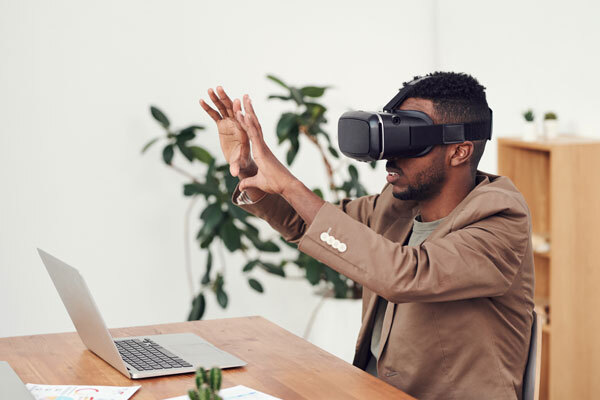Did you know that Jamiroquai’s 1996 album Travelling Without Moving was actually a prediction about the coming metaverse? OK I made that up to get your attention. But the album’s title is indeed the big question on everyone’s lips in travel. Could the virtual reality of the metaverse become a competitor reality for travel providers?
Not yet might be the short answer. Recently I embarked on a journey to try and actually experience the metaverse and the barriers to entry are really quite off-putting, so I can’t imagine many are yet doing this.

Firstly, you need expensive kit you can’t buy just anywhere (my €450 Oculus Quest 2 headset had to be ordered online). Then you need to set yourself up with a tutorial and, guess what, you need a Facebook account. An app is obligatory, as is high-speed internet. In total I was several hours in before I’d actually gone much beyond the basic interface. Then my rather heavy headset started to hurt my head after more than 30 mins of constant use and some experiences made me a bit nauseous.
Most surprising of all is that the metaverse everyone is talking about in the media – that of SimCity type worlds, where you can explore and build stuff – basically doesn’t exist yet. Decentraland is the one gaining all the news, but guess what? There isn’t a virtual reality version yet. In fact it doesn’t even have a mobile or tablet version yet. Yes, desktop only. Oh, and you need crypto coins and a wallet to pay for anything in those platforms – yet another quite big barrier to entry putting off the vast, vast majority of people.
Make no mistake about it, the modern virtual reality experience is out-of-this world (no pun intended). You are literally transported to other planets and feel like you are physically present due to not only the graphics, but the fact that you can touch things. But nothing that I can see currently really goes beyond gaming applications.
Is there anything happening yet that’s travel related? Of course, there are some exceptions. There’s an App called Wander that lets you, well, wander through Google Maps Street View. That’s not a bad way for someone to experience a destination and in time could be enhanced. And some hotels are putting themselves in the Metaverse too, for example Riu’s flagship hotel in the Plaza de España in Madrid can be experienced virtually. Meetings can take place virtually too, but I´m yet to figure out how to do that – perhaps because I didn’t yet get around to creating my own avatar (yet another hurdle, requiring geekery skills).
So does all of this mean that the Metaverse will just be a fad that travel doesn’t need to embrace? No. Thinking that way would be just as much of a mistake as dismissing the Internet would have been. That said, in our lifetimes this is unlikely to ever be an alternative to actually going on holiday or a business trip. Certainly there’s no indication the technology would ever emulate real world experiences like taste and smell for example.
But there’s nonetheless a great many applications for its use that could be highly relevant to the travel industry. Certainly at the inspiration stage of a booking experience the metaverse is going to be very influential. It won’t take too long before a failure to have a metaverse presence for a destination or travel service would be like not having a website now (or even 10 years ago).
For intermediaries it becomes not just another point of sale, but one that could be really powerful in selling – taking ‘let me show you some pictures’ to a whole new level. Likewise providers themselves can sell in this space too, direct to the public. Imagine being able not only to inspect a hotel room but to test the bed or request different sheets?

Customer service could be enhanced too. Want to see what’s on the menu? You literally can, perhaps in real time so that nothing that’s run out is offered by mistake or you can pick which of the two steak cuts they have left you’d prefer. Or maybe you can’t work out how the shower works in your room? In steps an augmented reality bellboy to show you how. It also makes ‘the manager’ much more accessible for a (virtual) face-to-face chat.
There are some other great uses too being explored, not least that of giving VR sets to passengers on airplanes to give the illusion of space. No doubt more uses will be invented quickly.
For travel businesses then the question is not should we be embracing the metaverse but rather a question of when. You’ve heard that the early bird gets the early worm – but have you ever thought that the second mouse gets the cheese? The road to travel’s metaverse utopia is likely to be lined with a mixture of both.














